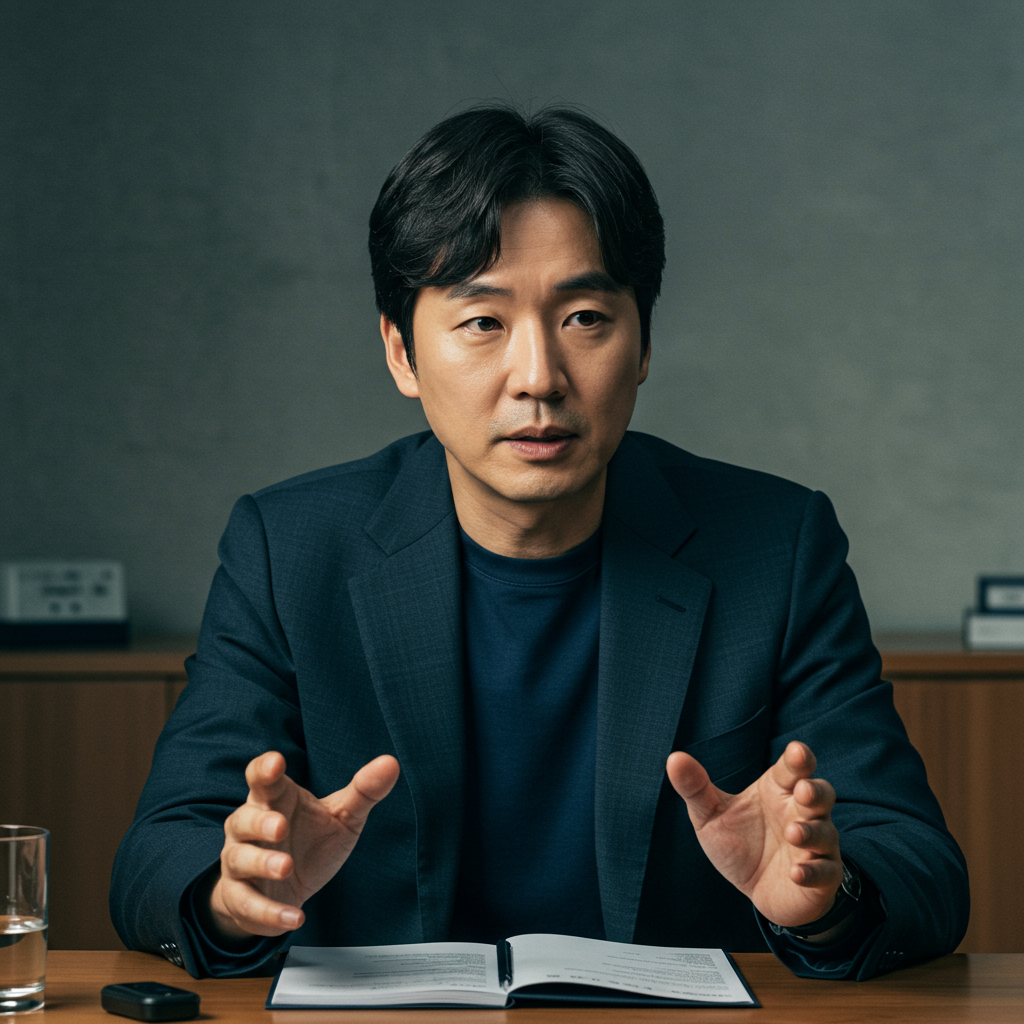The third season finale of Netflix’s global phenomenon squid Game delivered a gut-wrenching conclusion, leaving fans reeling from significant, tragic events. Among the most impactful was the sacrificial death of the protagonist, Seong Gi-hun (portrayed by Lee Jung-jae). This grim outcome diverged dramatically from the show’s initial trajectory and has sparked intense discussion.
Series creator, writer, and director hwang Dong-hyuk recently offered insights into the controversial ending and the creative decisions behind it. In an exclusive interview, Hwang detailed his original plans for Gi-hun’s fate, the surprising connection (or lack thereof) of a key cameo to a rumored American spinoff, and the potential for a fourth season of the original series. His revelations shed light on the evolving narrative and the deeper themes underpinning the show’s dark vision.
The Protagonist’s Unexpected Fate: Gi-hun’s Sacrifice
The decision to kill off the central character, Gi-hun, in the Season 3 finale was a stark, bleak choice that underscored the merciless nature of the Games. This dark finale saw Gi-hun make the ultimate sacrifice, reportedly throwing himself from a ledge to save a baby character. This grim outcome is a significant departure from the initial vision for the character across subsequent seasons.
According to Hwang Dong-hyuk, his original roadmap for Seasons 2 and 3 did not involve Gi-hun’s death. The early concept was for Gi-hun to survive the ordeal, perhaps even winning the Games again in some capacity, and ultimately returning to his daughter. This would have provided a more traditionally hopeful, or at least less tragic, resolution for the character who survived the initial deadly competition.
Why the Ending Changed So Drastically
The shift from a survivor’s return to a sacrificial death was a profound narrative change. Hwang explained that as he progressed through the writing process for the later seasons, he began to feel that the initially planned “happy ending” for Gi-hun no longer aligned with the realities of the world around him or the deeper implications of Gi-hun’s journey. Observing global events and reflecting on the themes of greed, inequality, and systemic violence depicted in the show, he concluded that a traditional “happily ever after” felt incongruous.
Instead, Hwang decided that a more fitting and impactful closure for Gi-hun’s story would be an act of self-sacrifice. This new direction allowed the character to demonstrate a profound moral choice, contrasting with the desperation and survival instincts that defined much of his earlier actions. His death became a symbolic act, intended to protect future generations from the horrors he endured and the system that perpetuates them.
Symbolism and Survival in the Bleak Finale
The finale painted a bleak picture of the Games’ enduring power. Reports indicate that Detective Jun-ho, who had sought to expose the operation, ultimately failed to shut it down or even significantly disrupt its functioning. The sheer scale of death remained horrifying: out of 456 participants, only two are said to have survived, meaning a staggering 99.56% perished.
Beyond Gi-hun’s sacrifice, the finale introduced a new, crucial element: a baby. Hwang Dong-hyuk incorporated a pregnant character into the story specifically so a baby would be born, serving as a powerful symbol. He emphatically stated that the baby was never intended to be sacrificed, calling the thought “way too dark.”
What the Baby Represents
The baby character holds significant symbolic weight within the narrative. Hwang explained that the baby represents the future, the next generation, the state of the world, and human conscience itself. These are all elements that, in the creator’s view, desperately need protection from the forces of greed and corruption that the Games embody.
Introducing the baby reinforced the thematic message that securing a better future requires difficult choices and sacrifices in the present. It symbolized the need to suppress personal greed and convenience for the sake of what is to come. Gi-hun’s sacrifice, in this context, is presented not just as an individual death but as an act directly tied to the hope symbolized by the baby, a choice made for the potential of a better future world. The two recorded survivors are cited as Player 256, saved discreetly by a sympathetic guard, and the aforementioned baby, Player 222.
Decoding Gi-hun’s Final, Unfinished Words
A poignant and mysterious moment in the final episode involved Gi-hun’s last words being deliberately left incomplete for the audience. This creative choice was highly intentional on Hwang Dong-hyuk’s part.
He shared his evolving perspective on the complexity of human nature. Hwang observed that humans are incredibly intricate beings, capable of immense hope and goodness in one moment, yet susceptible to overwhelming greed and selfishness in the next. This duality made it difficult for him to offer a simple, definitive statement about what it means to be human.
The Audience’s Role in Finishing the Sentence
By leaving Gi-hun’s final sentence unfinished, Hwang intended to pose a direct question to the audience. He wanted viewers to contemplate the question and complete the sentence themselves, reflecting on their own understanding of human nature and morality.
For the character of Gi-hun, Hwang believed that demonstrating the answer through action would be far more powerful than stating it explicitly in words. In the creator’s interpretation, Gi-hun did, in fact, complete his final message through the act of sacrificing himself. His ultimate choice served as his statement on what he believes humans should be – capable of selflessness and sacrifice for the greater good, particularly for the future generation symbolized by the baby.
That Surprise Cameo: Cate Blanchett as a Recruiter
The Season 3 finale included a surprising cameo appearance by acclaimed actress Cate Blanchett, introduced as a “Squid Game” recruiter operating in Los Angeles. This moment immediately fueled speculation, particularly regarding the rumored American spin-off series reportedly being developed by David Fincher.
Hwang Dong-hyuk addressed this speculation directly. He revealed that the scene featuring a female recruiter was conceived relatively late in the writing process for the final season. He specifically wanted a woman in that role, believing it would offer a different and potentially more impactful dynamic than the male recruiters previously seen.
The Cameo’s True Purpose
For such a brief, yet pivotal, moment, Hwang sought an actor with immense charisma capable of dominating the screen instantly. He and his production team were significant fans of Cate Blanchett and strongly desired her for the part. The offer was extended after filming for the season had already begun.
Crucially, Hwang explicitly denied that Blanchett’s cameo was intended to set up the rumored David Fincher-helmed “Squid Game: USA” show. He stated unequivocally that his sole purpose for including the scene was to create an impactful ending for Season 3 of the original series. While he acknowledged hearing rumors about the American adaptation, he confirmed he had not received official notification from Netflix regarding Fincher’s involvement. He reiterated that the scene’s function was purely as a conclusion to the third season’s narrative arc, not a direct bridge to a separate project.
The Future of Squid Game: Season 4 and Beyond
Given the global success of Squid Game, questions about future installments are inevitable. While Season 3 served as a definitive conclusion to the initial story involving Gi-hun’s journey, the open-ended nature of the organization behind the Games leaves room for expansion. Hwang Dong-hyuk discussed his potential involvement in future Squid Game projects.
His level of participation would depend significantly on the nature of the project. If Netflix were to greenlight a direct continuation of the original Korean series – effectively a Season 4 – Hwang stated that he would consider it essential for him to participate and lead the creative process. His deep understanding of the universe and characters would be crucial for maintaining continuity and thematic integrity.
Creator’s Role in Spin-offs
However, if the project were a separate entity, such as the rumored U.S. version or another geographic spin-off, Hwang indicated that his role would likely be less hands-on. For projects like the American adaptation, he envisions his contribution primarily involving sharing ideas and consulting rather than taking a lead role in writing or directing. He has no intention of being fully immersed in a distinct spin-off series.
Despite this preference for distance on spin-offs, Hwang expressed willingness to contribute if Netflix specifically requested his input and if it didn’t conflict with any other projects he might be working on at the time. This suggests that while he wants to maintain creative control over the core Korean narrative, he is open to lending his expertise to expand the Squid Game universe in other forms, acknowledging the franchise’s potential for global exploration.
Frequently Asked Questions
Why did the creator change Gi-hun’s ending from survival to sacrifice?
Show creator Hwang Dong-hyuk originally planned for Gi-hun to survive the entire series and reunite with his daughter. However, during the writing process, he felt that this happier ending didn’t align with the grim realities of the world or the trajectory of Gi-hun’s story. He decided a sacrificial death was a more fitting closure, symbolizing a choice made for future generations and highlighting the need to prioritize collective well-being over individual survival in the face of systemic issues.
Is the Cate Blanchett cameo setting up the rumored US Squid Game spinoff?
No, according to Hwang Dong-hyuk. He explicitly stated that the scene featuring Cate Blanchett as a recruiter in Los Angeles was created solely to provide an impactful ending for Season 3 of the original series. While rumors of a David Fincher-helmed American spin-off exist, Hwang denied the cameo was intended as a direct setup or connection to that separate project.
Will the original ‘Squid Game’ creator be involved in Season 4 or a US version?
Hwang Dong-hyuk stated his involvement would depend on the project type. If Netflix proceeds with a direct Squid Game Season 4 of the original series, he expects to lead it. For a U.S. version or other spin-offs, he anticipates a less hands-on role, primarily sharing ideas. He is open to consulting on spin-offs if needed, provided it doesn’t interfere with his other work.
Conclusion
The Season 3 finale of Squid Game delivered a powerful, albeit dark, conclusion to Seong Gi-hun’s journey, dramatically altering his fate from the creator’s initial plans. Hwang Dong-hyuk’s explanations reveal a deliberate narrative shift driven by thematic considerations and a desire to make a profound statement about humanity and the future. The final scene, while introducing a compelling new element with the LA-based recruiter cameo, is clarified as a thematic bookend rather than a direct teaser for a separate U.S. spin-off. While the original story arc for its protagonist has seemingly concluded, the creator’s openness to leading a potential Season 4 of the Korean series leaves the door open for further exploration of the Squid Game universe.
References
- variety.com
- <a href="https://www.imdb.com/de/news/ni65359588/?ref=nwcart_perm”>www.imdb.com
- <a href="https://www.imdb.com/pt/news/ni65359442/?ref=nwcart_perm”>www.imdb.com
- <a href="https://www.imdb.com/pt/news/ni65359234/?ref=ttnwr_1″>www.imdb.com
- www.imdb.com



